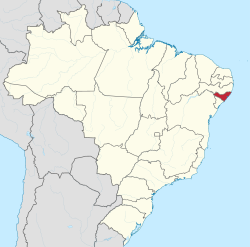
Back Alagoas ACE Alagoas Afrikaans ألاغواس Arabic Alagoas AST Alagoas Istadu Aymara Alaqoas Azerbaijani Алагоас Byelorussian Алагоас BE-X-OLD Алагоас Bulgarian আলাগৱাস BPY
Alagoas | |
|---|---|
|
| |
| Motto(s): Ad bonum et prosperitatem (Latin) "For which is good and for prosperity" | |
| Anthem: Hino de Alagoas | |
 | |
| Coordinates: 9°34′S 36°33′W / 9.57°S 36.55°W | |
| Country | |
| Founded | October 12, 1943 |
| Capital and largest city | Maceió |
| Government | |
| • Body | Legislative Assembly |
| • Governor | Paulo Dantas (MDB) |
| • Vice Governor | Ronaldo Lessa (PDT) |
| • Senators | Fernando Farias (MDB) Renan Calheiros (MDB) Rodrigo Cunha (UNIÃO) |
| Area | |
• Total | 27,845.1 km2 (10,751.1 sq mi) |
| • Rank | 25th |
| Population (2022)[1] | |
• Total | 3,127,683 |
| • Rank | 19th |
| • Density | 110/km2 (290/sq mi) |
| • Rank | 4th |
| Demonyms | Alagoano(a) or Alagoense |
| GDP | |
| • Total | R$ 76.266 billion (US$ 14.147 billion) |
| HDI | |
| • Year | 2021 |
| • Category | 0.684[3] – medium (26th) |
| Time zone | UTC-3 (BRT) |
| Postal Code | 57000-000 to 57990-000 |
| ISO 3166 code | BR-AL |
| License Plate Letter Sequence | MUA to MVK, NLV to NMO, OHB to OHK, ORD to ORM, OXN, QLA to QLM, QTT, QWG to QWL, RGO to RGZ, SAA to SAJ, TNH to TNQ |
| Website | governo.al.gov.br |
Alagoas (Brazilian Portuguese: [alaˈɡoɐs] ⓘ), officially State of Alagoas, is one of the 27 federative units of Brazil and is situated in the eastern part of the Northeast Region. It borders: Pernambuco (N and NW); Sergipe (S); Bahia (SW); and the Atlantic Ocean (E). Its capital is the city of Maceió. It has 1.6% of the Brazilian population and produces 0.8% of the Brazilian GDP. It is made up of 102 municipalities and its most populous cities are Maceió, Arapiraca, Palmeira dos Índios, Rio Largo, Penedo, União dos Palmares, São Miguel dos Campos, Santana do Ipanema, Delmiro Gouveia, Coruripe, and Campo Alegre.
It is the second smallest Brazilian state in area (larger only than Sergipe) and it is 16th in population. It is also one of the largest producers of sugarcane, coconuts, and natural gas in the country. Alagoas also has oil exploration, mostly of onshore deposits.
Land of the sururu (or Charru Mussel), lagoon shellfish which serves as food for the coastal population, and of coconut water, Alagoas also possesses some of the country's richest folklore.
Initially, the territory of Alagoas constituted the southern part of the Captaincy of Pernambuco and only gained its autonomy in 1817. Its occupation pushed the expansion of the captaincy's sugarcane farming, which required new areas of cultivation, southward. Thus arose Porto Calvo, Alagoas (now Marechal Deodoro) and Penedo, nuclei which guided the colonization, economic, and social life of the region for a long time.
The Dutch invasion in Pernambuco was extended to Alagoas in 1631. The invaders were expelled in 1645, after intense fighting in Porto Calvo, leaving the economy in ruins.
The escape of African slaves during the Dutch invasion created a serious labour shortage problem on the sugarcane plantations. Grouped in villages called quilombos, the Africans were only completely dominated at the end of the 17th century with the destruction of the most important quilombo, Palmares.
During the empire, the separatist and republican Confederation of the Equator received the support of noteworthy figures from Alagoas. Throughout the 1840s, political life was marked by the conflict between the lisos (lit. "straights", not the sexual orientation connotation), conservatives, and the cabeludos (lit. "hairies"), liberals.
At the beginning of the 20th century, the region's hinterland lived through the pioneering experience of Delmiro Gouveia, an entrepreneur from Pernambuco who installed the Estrela thread factory, which came to produce 200 spools daily. Delmiro Gouveia was killed in October 1917 in circumstances still unclarified, after being pressured, according to rumor, to sell his factory to competing foreign firms. After his death, his machines would be destroyed and thrown into Paulo Afonso Falls.
Nicknamed the Land of the Marshals (Terra dos Marechais), for being the birthplace of Deodoro da Fonseca and Floriano Peixoto, the first two presidents of Brazil, Alagoas gave the country numerous illustrious Brazilians among whom are the anthropologist Arthur Ramos, the maestro Hekel Tavares, the philologist Aurélio Buarque de Holanda, the musicians Djavan and Hermeto Pascoal the poet Jorge de Lima, the jurists Pontes de Miranda and Marcos Bernardes de Mello, besides the writers Lêdo Ivo and Graciliano Ramos.
- ^ "2022 Census Overview" (in Portuguese).
- ^ "PIB por Unidade da Federação, 2021". ibge.gov.br.
- ^ "Atlas do Desenvolvimento Humano no Brasil. Pnud Brasil, Ipea e FJP, 2022". www.atlasbrasil.org.br. Retrieved 2023-06-11.

